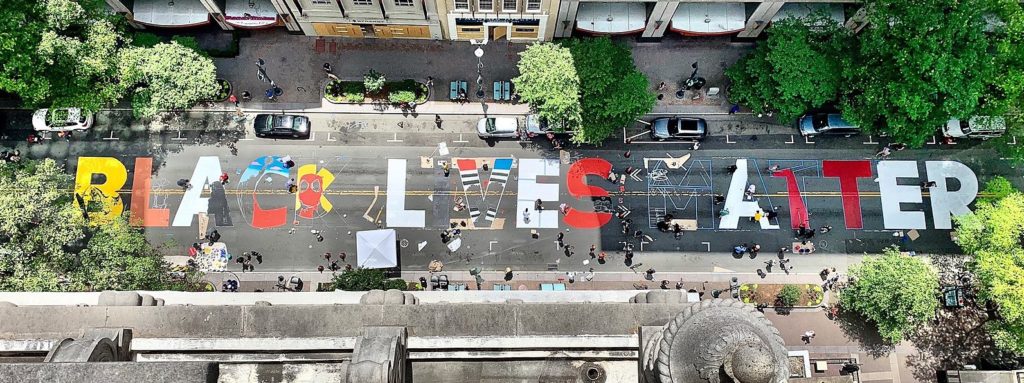Agrarian Trust Summer Newsletter

The recent uprisings are shaking the world. We are again at a tipping point that is a long time coming. Just as it always has, it will require not only weeks, months, or years of protest but decades and centuries of commitment to create a culture of equity and justice. Our country was founded on theft and violence perpetrated against Black and Indigenous people that has gone unacknowledged, unexamined, and unaddressed. As a consequence, racism is woven into every aspect of our lives. But it is not enough to offer words alone when we are called to act.
As a national land trust moving land into community ownership, we at Agrarian Trust hold at the forefront of our minds the long history of colonization, dispossession, theft, murder, and brutality in this land. The consolidation of 98 percent of all U.S. agricultural land into the hands of white people is an outcome of this painful history. The vast racial inequity in land ownership exacerbates inequities in virtually every arena: food, health, housing, politics, wealth.
That the Black community loses some 30,000 acres of land annually is by prejudicial design. From the requirement that formerly kidnapped and enslaved African-Americans have a credit history to secure a farm loan during Reconstruction to the denial of access to farm programs and lending that continues to the present day, we find countless examples of systematic policies and practices that have excluded and oppressed. Black communities have sought to rise out of this oppressive arrangement through legislation, litigation, starting businesses, building communities, and seeking self-determination in all manner of ways. Yet systems and institutions historically built to advantage white people have always sabotaged these efforts. Racism continues to hold its knee on the neck of the Black community. Our society cannot stand by watching and fearing for the next horrific incident.
We all have work to do in our communities to eliminate racism and must continually educate ourselves. Just as racism has evolved over time, our methods to dismantle it must also evolve. White supremacy is an ideology that is operational in our communities, organizations, and institutions. It thrives on complicity and ignorance. Only by understanding the ways in which we have enacted this insidious ideology can we dismantle racism within ourselves and our circles of influence.
Agriculture can be just and regenerative only when we center racial equity.
White people in particular must become conscious of what it means to be white in a racially constructed society and work to end policies and practices that advantage white people at the expense of people of color. For any of our white supporters who may reside in predominantly white rural areas, it is critically important that white people be engaged in antiracist organizing within white communities. But don’t go it alone. Join with others to build alliances, bonds, networks, and the ongoing support needed to identify and work through problems and challenges.
Do the work to become antiracist. Continually seek to educate yourself and your community. Read on for a list of resources to begin with.
If land is the basis of freedom, justice, and equality, as Malcolm X once said, then we must work to transform our relationship to the land and each other. While the Agrarian Commons model cannot possibly work for every community, the Agrarian Commons is an offering in the spirit of land justice:
Fear becomes a Fearless approach to land justice
Intimidation becomes Inspiration for community food sovereignty
Distraction becomes Focus on creating the world we want
Division becomes Unity as we heal ourselves and the land
Agriculture can be just and regenerative only when we center racial equity. We’re committed to continuing to engage in this work and invite you to join us. We welcome your comments to let us know how you’ve been showing up in support of racial equity. Find resources and organizations to support on our blog.
AGRARIAN COMMONS SPOTLIGHT
Little Jubba Central Maine Agrarian Commons

“For the last 30 years we have been refugees, moving through different towns in Somalia, and living in refugee camps in neighboring Kenya. For 30 years we have been looking for a place we can call home. Home in our community means a place that is safe and secure, where we can farm freely and where we can exercise our cultural traditions. Getting this property will check all the boxes and for the first time we have a place we call home.”
– Muhidin Libah, Co-founder and Executive Director of the Somali Bantu Community Association.
The Little Jubba Central Maine Agrarian Commons is a collaboration between the Somali Bantu Community Association, based in Lewiston Maine, and Agrarian Trust. This Agrarian Commons is critically important; acknowledging the land injustice that the Bantu peoples experience and knowing demographic and cultural realities that exist in Maine and Auburn – Lewiston. The Lewiston community experiences some of the highest poverty rates in the nation. Food insecurity rates for Black Mainers born in the US to US-born parents is a disproportionately high rate of 27.6 percent. This doubles to 51.6 percent for Black Mainers who are first or second generation immigrants.
The Little Jubba Central Maine Agrarian Commons prioritizes land security, equity, and tenure and is currently pursuing an exciting 107-acre farm acquisition. Stay tuned for updates and make a contribution to the Little Jubba Central Maine Agrarian Commons to support this land acquisition.


